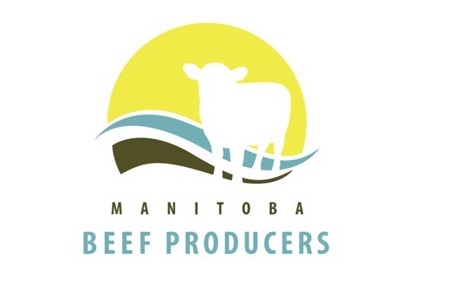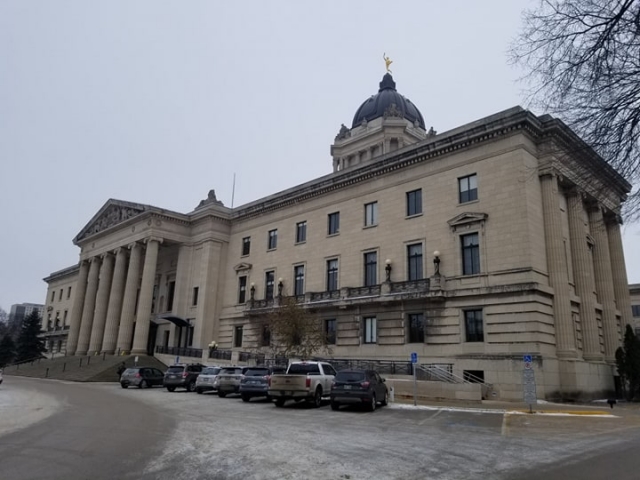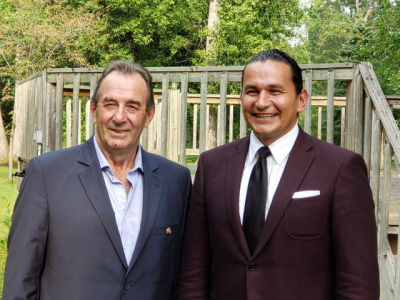 NewsNow
NewsNow
Manitoba Ag Days is in full swing and in its second day at the Keystone Centre in Brandon.
This morning featured the first winners of the innovation showcase crowned, and provincial Ag Minister Blaine Pedersen taking on producers' questions and concerns at the government booth.
The afternoon will feature a seminar performed by Rex Murphy.
The Keystone Centre is full of people taking in the 550 displays, seminars, and sales.
Ag Days runs until 5 today and continues tomorrow from 9 to 5.
- Details
- Contributed by Josh Sigurdson
This weekend on Saturday the Dauphin Pipeband is celebrating Scottish Heritage.
Kate Storey says Robbie Burns Night is at 7 pm at the Dauphin Legion.
“This is to celebrate all things Scottish. This celebration has been going on annually in Dauphin for 113 years, ever since 1907.”
Storey says Burns represents the common man or farmer.
“He was just a simple man, he was a farmer, not very well educated, but he was a poet and his songs became famous by the time he was in his 20’s. They came to symbolize everything Scottish, and so in January we celebrate his birthday, but also our Scottish Heritage.”
Some of Burns’ poems that became famous are ‘Auld Lang Syne’, ‘Selkirk Grace’, ‘A Man’s a Man’, ‘To a Mouse’, ‘A Red Red Rose’ and the ‘Address to the Haggis’.
The program with the Pipeband’s performance and a recital of the Address to the Haggis will be about 45 minutes, and then everyone will eat Scottish foods, including Haggis which is a rich meat dish made from mutton, onions and oatmeal.
Storey says the tradition is kept up by the Pipeband just because they love their Scottish Heritage.
Across the world, people of Scottish descent gather in January to honour their shared heritage with bagpipe music, traditional foods and with Burns’ poems and songs.
The event is free with donations welcome.
- Details
- Contributed by Isaac Wihak
Premier Brain Pallister says that Manitoba will have the cleanest fuel standards in Canada as part of the provinces “Made-in-Manitoba Climate and Green Plan”.
“We have the cleanest electricity in Canada already and soon we will have the cleanest fuels in Canada too,” said Pallister. “Manitoba is leading the country once again,”
Pallister says the new fuel standards will cut the province’s emissions by nearly 400,000 over the next 5 years, or the equivalent of taking 100,000 vehicles off of the road.
The province will increase the ethanol content requirement of gasoline to 10 percent from 8.5 percent, and the biodiesel content of diesel to five percent from two percent.
Pallister added that consultations with Manitobans will take place in the coming months, and any necessary regulation changes will be made in the spring.
After meeting with Prime Minister Justin Trudeau on Monday, Pallister is asking the Canadian government to take another look at the province’s climate plan to cap the carbon tax on Manitobans.
“Manitobans deserve respect for our green agenda, our historic and significant investments in clean, green renewable energy,” added Pallister, “Our plan puts a price on carbon that is low and level, like the Prairies, and keeps more money in the pockets of Manitobans while getting the same amount of emissions reductions as the rising federal carbon tax.”
He went on to say that Manitoba’s Made-in-Manitoba Climate and Green Plan is better for the economy, the environment, and better for Manitoban families.
Speaking at Ag Days, Pallister said that a provincial carbon tax would exempt grain-drying costs.
- Details
- Contributed by Josh Sigurdson
At Manitoba Ag Days, Agriculture and Resource Development Minister Blaine Pedersen announced the creation of a new committee to provide leadership on projects of strategic importance and encourage stakeholders to continue actions to implement the Manitoba Protein Advantage strategy.
Pedersen says the Manitoba Protein Consortium brings together members of the plant and animal protein value chains to provide leadership for a path to position Manitoba as first in class in sustainable protein industry development.
There are three main focuses for the Manitoba Protein Consortium, providing advice to the minister, industry, academia and other stakeholders on implementing the Manitoba Protein Advantage, engaging with stakeholders to define sustainability and create metrics to quantify Manitoba’s sustainability advantage, and ensuring that stakeholders are accountable for specific actions under the Manitoba Protein Advantage.
The Manitoba Protein Consortium supports Manitoba’s Economic Growth Action Plan, which identifies priority areas including the development of targeted sector strategies as a way to foster competitiveness, facilitate growth, identify investment opportunities and address economic barriers in the province.
- Details
- Contributed by Isaac Wihak
Producers in Manitoba have paid nearly $1.7 million in carbon tax related to the cost of drying grain, according to calculations done by Keystone Agricultural Producers.
KAP president Bill Campbell said that the organization is firm in its position that farmers should be exempt from the carbon tax.
“There needs to be an exemption for farmers under the carbon tax framework for all costs associated with drying all-grain, as well as for heating barns and farm buildings,” said Campbell. “Now that Manitoba falls under the federal backstop, farmers are left paying prices that, as price-takers in the global economy, cannot be passed along”
Following the meeting of agricultural ministers from across the country last year, KAP worked with producers in Manitoba to compile the data necessary to plead a case against the carbon tax. Federal Ag Minister Marie-Claude Bibeau and Provincial Ag Minister Blaine Pedersen requested the information.
The data collected show that on average, producers paid $3.69 per acre in carbon tax on grain drying, including propane and natural gas. A farmer growing 500 acres of corn, for example, would have paid around $14,000 on fuel for drying, with the carbon tax adding $1,722 to costs.
Due to a wet harvest, many producers in the province had to dry grain that normally wouldn’t have had to be dried.
At Ag Days this week, KAP is asking producers to stop by their booth with their fuel bill from drying grain, so that they can strengthen their case against the carbon tax.
KAP also hopes to work with the province to present a unified case to the federal government, as to why farmers across the country need to be exempt from the carbon tax.
In November 2019, Campbell had requested a meeting with Prime Minister Trudeau on the topic.
- Details
- Contributed by Josh Sigurdson
The Liberal government will start the process of ratifying the new United States- Mexico-Canada trade agreement next week.
During a press conference in Winnipeg, Prime Minister Justin Trudeau said that a ways and means motions will be introduced on Monday. The motion is the needed first step for the approval of fiscal bills.
“Passing the new NAFTA is our priority,” said Trudeau. “There are too many businesses relying on access to the U.S market. It’s extremely important that we move forward with ratification and it’s our intention to move forward with this.”
Ratifying the new trade deal has been a long process. Mexico first ratified the deal last summer, and the U.S. ratified the deal earlier this month.
Now that the motion to ratify is being put forward, the Liberals will need to work with other parties to get the legislation passed.
The Conservatives said they feel like they have not received enough details from the government on the content of the new agreement to guarantee their support.
NDP Leader Jagmeet Singh has not yet said whether or not his party will back the deal.
- Details
- Contributed by Josh Sigurdson
Two climate change projects based in Manitoba are receiving funding from the federal government.
Eco-West Canada and the Assiniboine Park Conservancy are each receiving $100,000 to assist their fights against climate change.
Eco-West promises to work with small and medium-sized companies to raise awareness and provide risk mitigation training to municipalities across the prairies.
Assiniboine Park promises to engage youth and create a social media campaign to address how to face barriers to effectively fight climate change.
The pair of organizations are 2 of 19 organizations receiving funding from the federal government as part of the Climate Action Fund.
The Climate Action Fund is part of the government’s strategy to achieve net-zero emissions by 2050.
- Details
- Contributed by Josh Sigurdson
After meeting with Prime Minister Justin Trudeau, Premier Brian Pallister said that he is prepared to unveil a modified climate change plan that may include a carbon tax.
He added that he wants the federal government to recognize Manitoba’s record on environmental protection.
“We deserve to be respected for our green record,” said Pallister. “We do not deserve to be called climate change deniers by anybody.”
The Premier said that dialogue between the province and the federal government will continue about Manitoba’s strategy going forward. He added that is prepared to modify the province’s climate change plan to include “some kind” of a carbon price.
Pallister didn’t provide details on the proposed price, but said he’d prefer it to be “flat and low like the prairie horizon”.
Pallister’s announcement comes during the federal cabinet ministers retreat in Winnipeg that began yesterday.
Having the retreat in Winnipeg is part of an effort by Prime Minister Trudeau to try and repair his government’s strained relationship with the western provinces.
During the retreat, the cabinet is trying to outline plans for its minority government going forward.
- Details
- Contributed by Josh Sigurdson
Manitoba Beef Producers held a two-day youth retreat last week near Brandon.
40 young farmers between the ages of 18 and 39 gathered at the Manitoba Beef and Forage Initiatives farm north of Brandon.
MBP President Tom Teichroeb says he is happy about the success of the first-ever event.
“From my perspective, it went really well,” said Teichroeb. “By all accounts, it sounded very, very positive from the young participants that did attend. I think it certainly gave us a great guideline to hopefully try and make this an event that we do more often.”
The retreat centred on the topic of farm succession, including tax and financial issues, and land acquisitions.
Teichroeb says that it’s enlightening to see young farmers take interest in retreats like this.
“To see that passion, and to see those folks, wanting to be a part of the industry is very, very encouraging,” said Teichroeb. “Just overall, very positive.”
- Details
- Contributed by Josh Sigurdson
A notice of registration for candidates is out for a municipal by-election in Gilbert Plains which will take place on Wednesday, April 8th.
The by-election is for 1 vacant councillor spot and if you'd like to fill it, you have until Tuesday, March 3rd to register as a candidate. This can be done by phoning Leanne McKay, Senior Election Official at 204-548-2326 to get a registration form. You can also fax her at 204-548-2564.
Registration forms can be submitted to the Gilbert Plains Municipal Office at 201 Main Street North in Gilbert. A candidate must register themselves before they can accept any donations, raise funds, borrow money, or incur expenses during their campaign.
Click here to view the official notice of registration which you can also find at gilbertplains.com.
- Details
- Contributed by Alec Woolston
The Governement of Manitoba has sent a mandate letter to colleges and universities in the province, outlining a new funding formula.
Economic Development and Training Minister Ralph Eichler urged schools in the letter to look at sharing procurement and other services. He added that schools should explore centralizing the application system, and seek provincial approval for capital projects, regardless of who is funding the project.
In the letter, Eichler went on to say that colleges and universities need to be vigilant when it comes to management staffing levels and salaries paid to senior executives.
The mandate letter says that a new funding system will be developed that tie funding to a performance measurement.
- Details
- Contributed by Josh Sigurdson


















